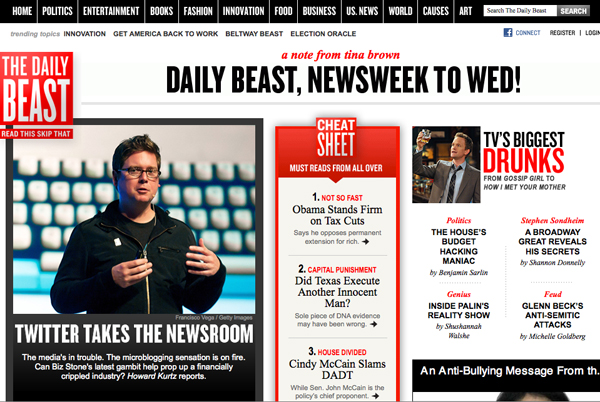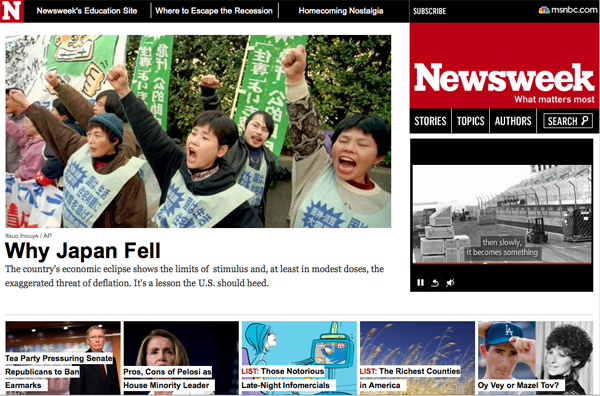Business Maverick, Media
The Daily Beast and Newsweek merger: happily ever after?

It's been years since we've seen a marriage between old and new media. The messy, expensive divorce that ended wedded bliss for AOL and Times Warner probably scared off other companies from taking the plunge. But The Daily Beast’s and Newsweek’s off-again, on-again relationship talks finally ended with Tina Brown posting online late on Thursday night: “Daily Beast, Newsweek to Wed!” And it appears the first female editor of Newsweek will be the one wearing the pants in the relationship. By THERESA MALLINSON.
When Sidney Harman bought Newsweek from the Washington Post Company for $1 on 2 August 2010, editor John Meacham promptly resigned. It didn’t take long for Harman to start romancing Daily Beast editor Tina Brown. On 6 October, Brown posted that, “there have been some interesting discussions going on [with Newsweek]”, but a few days later she admitted that the “wedding plans” were off. Or, in her own words: “The engagement was fun but the pre-nup got too complex.”
With Thursday night’s announcement of The Daily Beast-Newsweek merger, the pre-nup complications have clearly been ironed out, but that doesn’t mean it’s going to be an easy marriage. The newly formed Newsweek Daily Beast Company will be a 50-50 joint venture. However, relationships don’t usually work out as neat 50-50 arrangements; most often there’s some sort of a power struggle involved.
Brown will now be the editor-in-chief of both publications, the Daily Beast president, Stephen Colvin, will be the new company’s chief executive and Harman its executive chairman. Both Brown and Harman have, naturally, described the merger in glowing terms, with Brown writing: “…The Daily Beast’s animal high spirits will now be teamed with a legendary, weekly print magazine in a joint venture” and Harman releasing a statement saying: “…this merger provides the ideal combination of established journalism authority and bright, bristling website savvy.” They’re clearly still in the honeymoon period.
Brown elaborated on her feelings about the merger, “I see Newsweek and the Beast as a marriage between Newsweek’s journalistic depth and the vibrant versatility the Daily Beast has realized on the web. The metabolism of the Daily Beast will help power the resurgence of Newsweek, and Newsweek amplifies the range of talent and audience the Daily Beast can reach.” But can this vision become a reality, with Newsweek and The Daily Beast living happily ever after?
The big bone of contention will be over who’ll end up calling the shots in the relationship. It’s not much use looking at who has the money, as in this case, it’s neither party. According to the Wall Street Journal, Newsweek looks likely to lose at least $20 million in 2010, while The Daily Beast is on track to lose about $10 million. But, for once, this isn’t the be-all and end-all, since both publications have backers who seem willing to keep shelling out the bucks, if not indefinitely, then for longer than usual.

So far, it appears very much as if Brown is the one in command. For her, and The Daily Beast, Newsweek is a nice-to-have. It’ll be nice for The Daily Beast to be connected to the prestige of Newsweek. It’ll be nice for The Daily Beast staff to have somewhere to print more in-depth investigative and narrative pieces. It will also be nice for The Daily Beast to have access to Newsweek’s 5.4 million “unique” website visitors a month (it has an estimated 2.9 million users of its own), not to mention its 1.5 million magazine subscribers.
Brown has shown she was willing to walk away from the union if it wasn’t on her terms. Harman didn’t have that luxury.
For Newsweek, The Daily Beast appears to be more a case of have-to-have. Harman may have financially “rescued” Newsweek in August, but the ailing magazine needs more than money to revive it. In August he told his new staff: “I’m not here to make money. I’m here to make joy.” But since Harman bought the ailing magazine, he hasn’t had much love to spread. High-profile resignations since his tenure began include Meacham, Fareed Zakaria, Evan Thomas and Michael Isikoff. Brown diplomatically referred to Harman as the “owner (and savior) of Newsweek” in her note. Fair enough, he stumped up the money to buy the magazine. But it’ll be up to Brown to do the hard work of really saving Newsweek.
Why both online and print media will be watching Brown closely, and what gives this partnership added interest beyond the generic “can online media save print?” take, is Brown’s hugely successful career as a magazine editor. This is the person who revived Tattler magazine when she took over the reins at just 25 years old; the person who brought Vanity Fair back to life; the person who reinvigorated The New Yorker. And we’re not just talking about revamping editorial content, but actually bringing in more readers (not to mention more advertising dollars).
With the creation of The Daily Beast to add to her CV, it seems that everything Brown touches turns to gold. Well, not quite everything. Talk magazine, which she launched in 1999, and was closed down a mere two-and-a-half years later, lost its backers, Miramax and Hearst, millions of dollars. Brown was phlegmatic about this perceived failure, saying in 2002: “My reputation rests on four magazines – three great successes, one that was a great experiment.” In a National Public Radio interview on Friday, she had pretty much the same view of her career – with a slight tweak – referring to it as “Four Weddings and a Funeral”.

Some commentators, including Erick Schonfeld writing for TechCrunch, see Brown’s current experiment as harmful to both parties, calling the union a “monstrous combination”. He writes: “Combining the two news brands would be a disaster. Just look at what each publication stands for. Newsweek is a storied publication whose tag line is, ‘What Matters Most’. The Daily Beast’s, meanwhile, is. ‘Read This Skip That’. … Newsweek is a valuable brand, and Brown a capable editor who once ran the New Yorker. But why make a bet on a dying, debt-laden print magazine now? And online it might make more economic sense to combine the two sites and gain broader reach… But those are two very different audiences looking for different things.”
But, as Schonfield acknowledges, and as the unwieldy moniker the Newsweek Daily Beast Company points to, the two publications will retain their separate identities (if not staff and advertising sales), at least for now. The website operations will reportedly merge, but this doesn’t affect Newsweek’s identity all that much, as it is still largely a magazine brand.
One gets the sense that Brown is carefully looking for synergies, but without making the mistake of forcing them. Her first task is to reinvent the magazine, and we know she’s good at this – she’s done it three times before. This time she’ll be approaching her new editing job with a sharp focus on how to make the magazine relevant in the 21st century.
When Brown started The Daily Beast back in 2008, the last thing on her mind was saving print. Fast-forward to 2010 and the distance afforded by her online venture has probably given her greater insight into viable ways of doing just that; she looks on the medium with the acute eye of an old friend, rather than the blindness of a current flame. We’re not saying the Newsweek Daily Beast Company is definitely going to work out, but that there’s no one better qualified than Brown to bridge the great digital-print divide. And we hope that her latest experiment is ultimately classified as a success. DM
Read more: The Observer, Tina Brown’s note on The Daily Beast, Media Decoder at The New York Times, Washington Post, TechCrunch. Listen to more: NPR interview.
Photo: Tina Brown, founder of www.thedailybeast.com, asks a question to Richard Holbrooke, U.S. Special Representative for Afghanistan and Pakistan during a panel discussion at the Clinton Global Initiative in New York September 21, 2010. REUTERS/Chip East




















 Become an Insider
Become an Insider